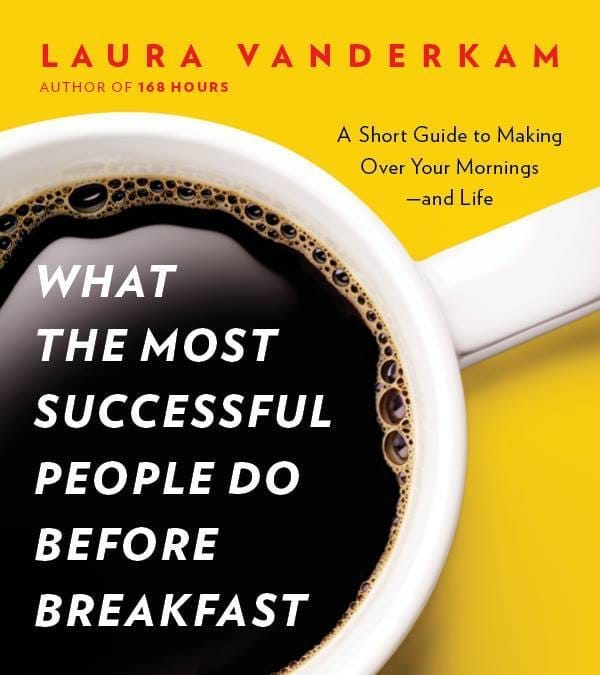หนังสือ "What the most successful people do before breakfast"
I read the book "What the most successful people do before breakfast", so I want to compile the essence so that I can put it into practice right away + more examples that I got.

หนังสือ "What the most successful people do before breakfast"
Senior executives in large organizations tend to wake up very early.
According to a survey by Yahoo! Finance, there is interesting information such as:
- Tim Cook (CEO of Apple) wakes up every morning at 4:30 a.m. to check his mail. (Tim Cook was one of the first employees to work at Apple every day).
- Howard Schultz (CEO of Starbucks) wakes up at 4:30 a.m. and goes on a bike ride with his wife before arriving at the office at 6 a.m.
- Paul Polman (CEO of Unilever) wakes up at 6 a.m. and runs to the office every day.
- Andrea Jung (CEO of Avon) wakes up at 5 a.m. every day and has to go to the gym. Exercise every morning before work at 8 a.m.
- Former President George Bush's father, woke up at 4 a.m. to run, before arriving at the office at 6 a.m. While George W. Bush, who was born at 4 a.m., also clocked in at 6:45 a.m. several times, Bush usually scheduled a meeting at this time!!
The reason why these senior executives wake up early is because the morning is the time when the brain is fresh and clear. Do not be distracted by colleagues or other activities. Morning is a productive time every day.
Successful people/senior executives How do they build a habit in the morning to achieve high productivity?
He spends the morning doing 3 important tasks:
1. Axis of the profession Career - Planning important and focusing on work, doing important projects.
2. The axis of affinity - both with the spouse If you both work to earn money for your family, you usually have little time to talk because you are tired from work, and when you come home, you often complain about work or talk about problems at work. Plan to invite each other to travel. There are more conversations that invite you to build a good relationship with each other than during other periods.
3. Own core - Senior executives often spend the morning exercising and often do it regularly to promote good health (work hard, use a lot of brain. If you are not healthy, you may get sick. The body deteriorates easily).
People have different willpower. When we do any activity such as exercising, working, etc. Anything that requires a lot of effort uses a lot of willpower, but if the activity becomes a habit at any time, the willpower used will be very small.
For example, when we play a new gym, we will be very tired, we may become bored (lose a lot of willpower), but when we play for a long time and it becomes a habit, we will no longer feel tired, bored, and bored.
Or from people who sleep late but have to wake up early. At first, it would be painful to be forced to wake up, but when waking up often in the morning becomes a habit, we will not feel that we are tormented. When I have to wake up early again.
To create good habits in the morning. There are simple steps to follow. 5 Steps
1. Keep a timer to see each of your activities each day. For example, brushing your teeth for 5 minutes, taking a shower for 30 minutes, getting dressed for 1 hour, coming home to watch a drama for 1 hour, watching TV for 3 hours, playing Facebook for another hour, and then sleeping.
This step is to assess how much time is really wasted each day. What do we do, how long do we do it?
It is recommended to try the track every day for a period of 1 week to find the average.
2. Set a dream time that we want to do, such as reducing the bath from 30 minutes to 10 minutes, getting dressed for 1 hour to 15 minutes, watching TV from 4 hours to 2 hours, playing Facebook to 15 minutes. At this stage, we will see how much time we have to do other things.
Put 3 axes of activities into it, how much work to give, how much to give to relationships, and how much to give to yourself.
With the same amount of time spent. We will be able to do all the activities that we have done while building good habits + increasing productivity for ourselves.
3. Write down the possible time by comparing the actual time of the day (item 1) with the dream time (item 2) to find the perfect point that you think you can actually do for the activities.
We can see what we spend our time on in an unreasonable way.
For example, we wake up late because we spend too much time watching TV and playing Facebook, which makes our bodies tired and exhausted from working during the day.
4. Make activities a habit
Some activities may require high willpower at the beginning, but as you continue to do them for a long time, they will eventually turn into habits.
We may use a small adjustment method to make the body adapt and not lose much willpower each day.
For example, if you wake up at 8 a.m. but want to wake up at 6 a.m., you may start by waking up 15 minutes earlier for a while, and then gradually adjust the time until you reach the target of 6 a.m. you want.
It is recommended to change your habits. The body will not be confused and encourage itself inside.
5. Adjust as appropriate When the activity changes, it can be increased or decreased.
After reading it, I thought that I need to adjust myself to be productive like this.

